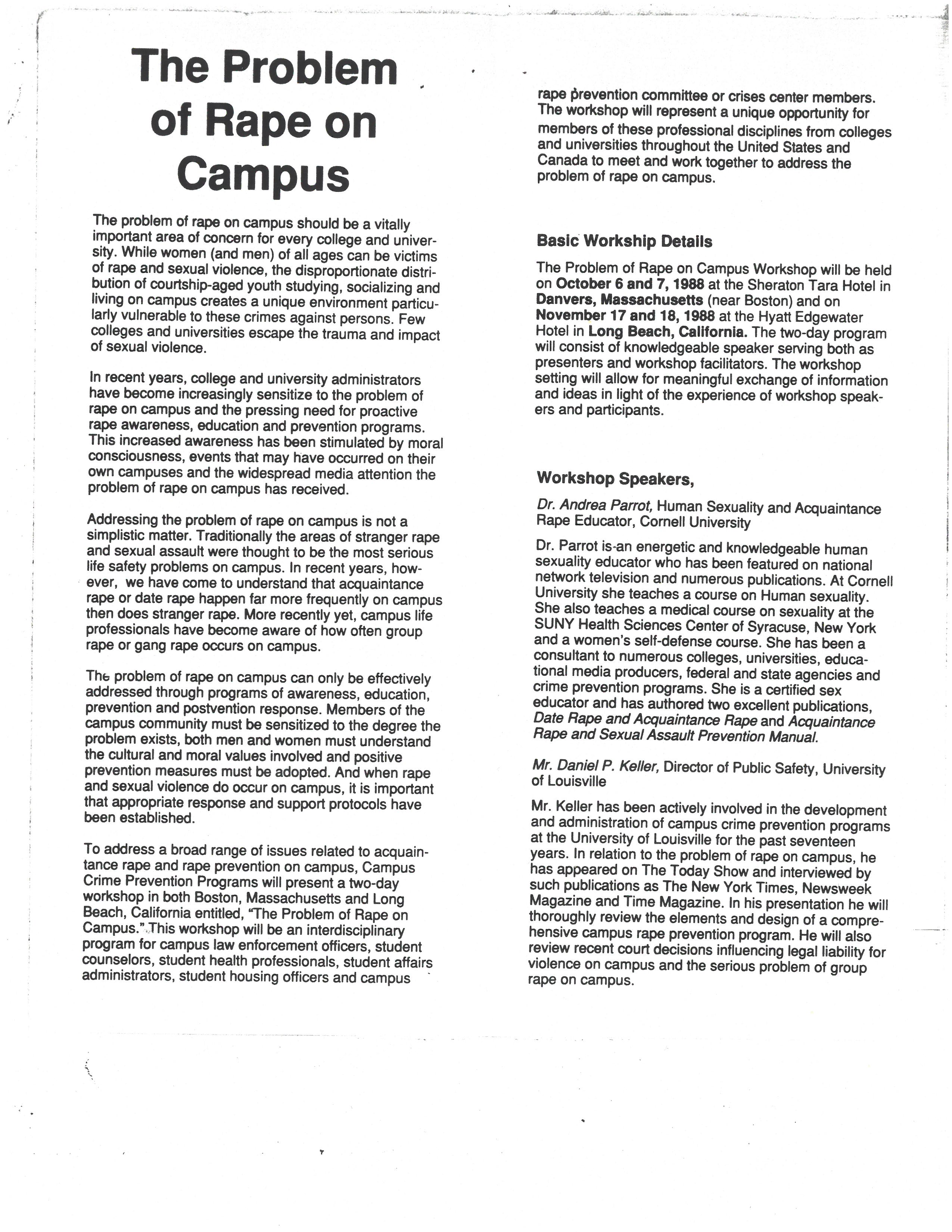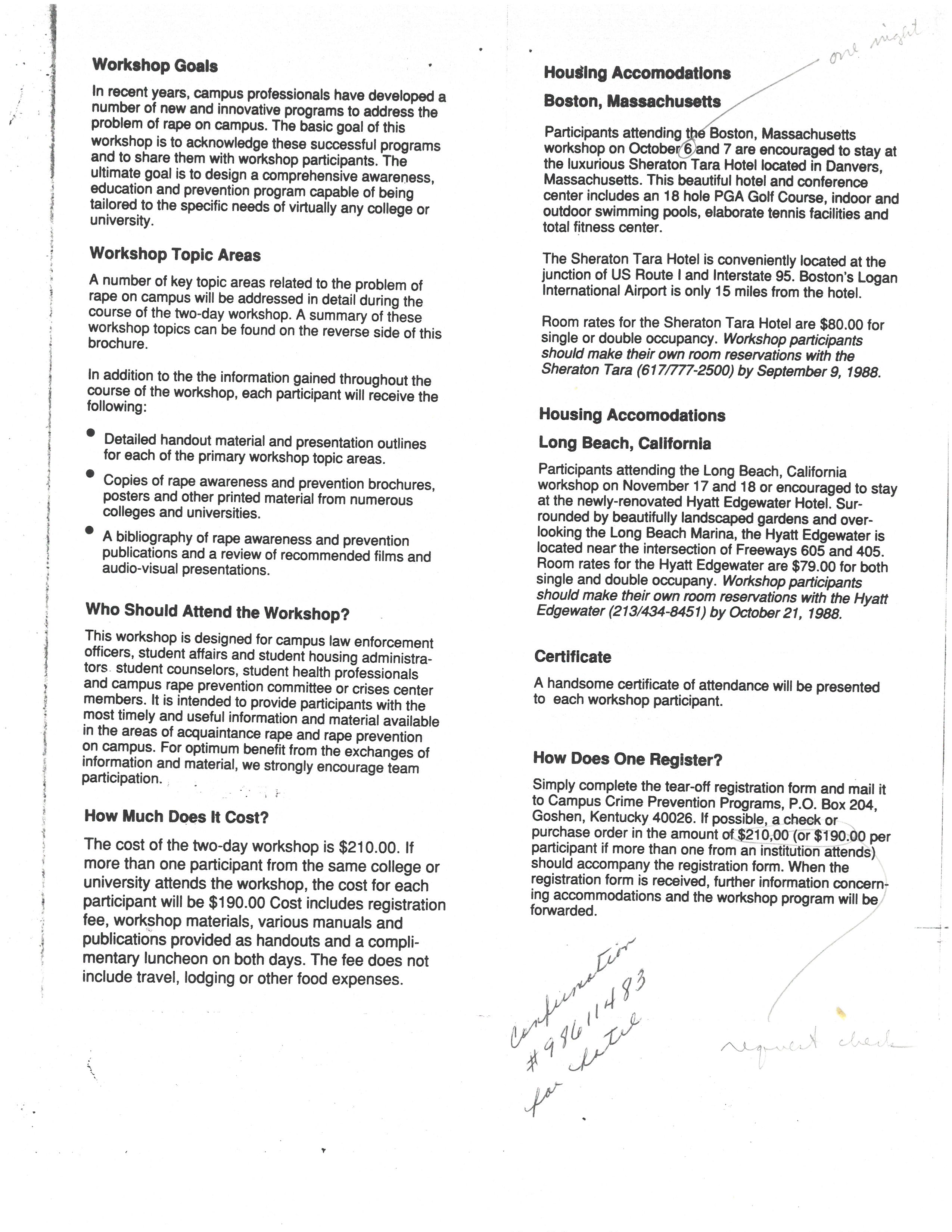  |
Transcription:
The Problem of Rape on Campus
The problem of rape on campus should be a vitally important area of concern for every college and university. While women (and men) of all ages can be victims of rape and sexual violence, the disproportionate distribution of courtship-aged youth studying, socializing and living on campus creates a unique environment particularly vulnerable to these crimes against persons. Few colleges and universities escape the trauma and impact of sexual violence.
In recent years, college and university administrators have become increasingly sensitized to the problem of rape on campus and the pressing need for proactive rape awareness, education and prevention programs. This increased awareness has been stimulated by moral consciousness, events that may have occurred on their own campuses and the widespread media attention the problem of rape on campus has received.
Addressing the problem of rape on campus is not a simplistic matter [sic]. Traditionally the areas of stranger rape and sexual assault were thought to be the most serious life safety problems on campus. In recent years, however, we have come to understand that acquaintance rape or date rape happen far more frequently on campus then [sic] does stranger rape. More recently yet, campus life professionals have become aware of how often group rape or gang rape occurs on campus.
The problem of rape on campus can only be effectively addressed through programs of awareness, education, prevention and postvention response. Members of the campus community must be sensitized to the degree the problem exists, both men and women must understand the cultural and moral values involved and positive prevention measures must be adopted. And when rape and sexual violence do occur on campus, it is important that appropriate response and support protocols have been established.
To address a broad range of issues related to acquaintance rape and rape prevention on campus, Campus Crime Prevention Programs will present a two-day workshop in both Boston, Massachusetts and Long Beach, California entitled, “The Problem of Rape on Campus.” This workshop will be an interdisciplinary program for campus law enforcement officers, student counselors, student health professionals, student affairs administrators, student housing officers and campus rape prevention committee or crises center members. The workshop will present a unique opportunity for members of these professional disciplines from colleges and universities throughout the United States and Canada to meet and work together to address the problem of rape on campus.
Basic Workship [sic] Details The Problem of Rape on Campus Workshop will be held on October 6 and 7, 1988 at the Sheraton Tara Hotel in Danvers, Massachusetts (near Boston) and on November 17 and 18, 1988 at the Hyatt Edgewater Hotel in Long Beach, California. The two-day program will consist of knowledgeable speaker [sic] serving both as presenters and workshop facilitators. The workshop setting will allow for meaningful exchange of information and ideas in light of the experience of workshop speakers and participants.
Workshop Speakers, Dr. Andrea Parrot,[2] Human Sexuality and Acquaintance Rape Educator, Cornell University
Dr. Parrot is an energetic and knowledgeable human sexuality educator who has been featured on national network television and numerous publications. At Cornell University she teaches a course on Human Sexuality. She also teaches a medical course on sexuality at the SUNY Health Sciences Center of Syracuse, New York and a women’s self-defense course. She has been a consultant to numerous colleges, universities, educational media producers, federal and state agencies and crime prevention programs. She is a certified sex educator and has authored two excellent publications, Date Rape and Acquaintance Rape and Acquaintance Rape and Sexual Assault Prevention Manual.
Mr. Daniel P. Keller,[3] Director of Public Safety, University of Louisville
Mr. Keller has been actively involved in the development and administration of campus crime prevention programs at the University of Louisville for the past seventeen years. In relation to the problem of rape on campus, he has appeared on The Today Show and interviewed by such publications as The New York Times, Newsweek Magazine and Time Magazine. In his presentation he will thoroughly review the elements and design of a comprehensive campus rape prevention program. He will also review recent court decisions influencing legal liability for violence on campus and the serious problem of group rape on campus.
Workshop Goals In recent years, campus professionals have developed a number of new and innovative programs to address the problem of rape on campus. The basic goal of this workshop is to acknowledge these successful programs and to share them with workshop participants. The ultimate goal is to design a comprehensive awareness, education and prevention program capable of being tailored to the specific needs of virtually any college or university.
Workshop Topic Areas A number of key topic areas related the problem of rape on campus will be addressed in detail during the course of the two-day workshop. A summary of these workshop topics can be found on the reverse side of this brochure.[4]
In addition to the information gained throughout the course of the workshop, each participant will receive the following:
Who Should Attend the Workshop? This workshop is designed for campus law enforcement officers, student affairs and student housing administrators, student counselors, student health professionals and campus rape prevention committee or crises center members. It is intended to provide participants with the most timely and useful information and material available in the areas of acquaintance rape and rape prevention on campus. For optimum benefit from the exchanges of information and material, we strongly encourage team participation.
How Much Does It Cost? The cost of the two-day workshop is $210.00. If more than one participant from the same college or university attends the workshop, the cost for each participant will be $190.00 Cost includes registration fee, workshop materials, various manuals and publications provided as handouts and a complimentary luncheon on both days. The fee does not included travel, lodging or other food expenses.
Housing Accomodations [sic] Boston, Massachusetts Participants attending the Boston, Massachusetts workshop on October 6[5] and 7 are encouraged to stay at the luxurious Sheraton Tara Hotel located in Danvers, Massachusetts. This beautiful hotel and conference center includes an 18 hole PGA Golf Course, indoor and outdoor swimming pools, elaborate tennis facilities and total fitness center.
The Sheraton Tara Hotel is conveniently located at the junction of US Route I and Interstate 95. Boston’s Logan International Airport is only 15 miles from the hotel.
Room rates for the Sheraton Tara Hotel are $80.00 for single or double occupancy. Workshop participants should make their own room reservations with the Sheraton Tara (617/777-2500) by September 9, 1988.
Housing Accomodations [sic] Long Beach, California Participants attending the Long Beach, California workshop on November 17 and 18 or encouraged to stay at the newly-renovated Hyatt Edgewater Hotel. Surrounded by beautifully landscaped gardens and overlooking the Long Beach Marina, the Hyatt Edgewater is located near the intersection of Freeways 605 and 405. Room rates for the Hyatt Edgewater are $79.00 for both single and double occupancy. Workshop participants should make their own room reservations with the Hyatt Edgewater (213/434-8451) by October 21, 1988.
Certificate A handsome certificate of attendance will be presented to each workshop participant.
How Does One Register? Simply complete the tear-off registration form and mail it to Campus Crime Prevention Programs, P.O. Box 204, Goshen, Kentucky 40026. If possible, a check or purchase order in the amount of $210,00 (or $190.00[6] per participant if more than one from an institution attends) should accompany the registration form. When the registration form is received, further information concerning accommodation and the workshop program will be forwarded.
[handwritten: Confirmation #98611483 for hotel]
[Transcribed by Shizhe Hu] |
[1] The workshop was put on by the “Campus Crime Prevention Programs” which was owned by Goshen Enterprises. Goshen Enterprises was owned by Daniel P. Keller, who is also the founder of the American Crime Prevention Institute (ACPI). According to the Institute’s website today, they currently hold similar programs to this, making it likely that the “Campus Crime Prevention Programs” was either an offshoot or a subgroup of the ACPI (“Goshen Enterprises, Inc. in Goshen, KY – Reviews – Bizapedia Profile,” Bizapedia.com, Accessed 21 July 2016. Source.; “Welcome to ACPI,” American Crime Prevention Institute, Accessed 21 July 2016. Source).
[2] Andrea Parrot is a Professor in Department of Policy Analysis and Management at Cornell University (1981-present). Her Cornell biography reads: “Her research interests have revolved around women’s health issues, sexual assault, infertility, and cross cultural women’s health and violence against women… She has made hundreds of presentations on sexual assault prevention on college campuses through the country… Her most recent books, co-authored with Nina Cummings, are Forsaken Females: The Global Brutalization of Women (2006) published by Rowman and Littlefield, and The Sexual Enslavement of Girls and Women Worldwide (2008) published by Praeger.” (“Andrea Parrot – Cornell University Human Ecology, Bio Page,” Accessed 15 July 2016. Source).
[3] Daniel P. Keller served as the Director of Public Safety at the University of Louisville, 1971-1997. In 1998 he founded the American Crime Prevention Institute, where he now serves as Executive Director. From a Bloomberg profile: “ Mr. Keller is a nationally recognized authority in the field of institutional and campus crime prevention and protection. He continues to write extensively in the field of crime prevention and conducts training and certification programs for campus and law enforcement agencies throughout the nation (“Mr. Daniel P. Keller,” American Crime Prevention Institute, Accessed 15 July 2016, Source.; “Daniel P. Keller: Executive Profile & Biography – Businessweek,” Bloomberg, Accessed 15 July 2016. Source).
[4] There is nothing on the reverse of this brochure; it is possible that this was an error, or that the archived brochure is a copy of the original document.
[5] The number 6 is circled with a line drawn to the margin where “one night” is handwritten.
[6] “210,00 (or $190.00)” is circled with a line to the bottom of the page, where “request check” is handwritten.